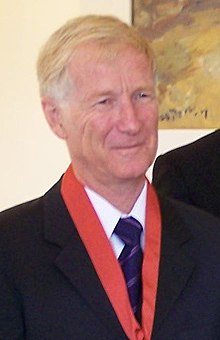Ted Baker | |
|---|---|
 Baker in 2008 | |
| Born | Edward Neill Baker 29 October 1942 |
| Alma mater | University of Auckland |
| Awards |
|
| Scientific career | |
| Fields |
|
| Institutions | |
| Thesis | Structural studies of some copper(II) coordination compounds (1967) |
| Doctoral advisor | |
| Doctoral students | Tamir Gonen[1] |
Edward Neill Baker CNZM (born 29 October 1942) is a New Zealand scientist specialising in protein purification and crystallization and bioinformatics. He is currently a distinguished professor at the University of Auckland.[2]
Born at Port Stanley in 1942 to New Zealanders Harold and Moya (née Boak) Baker,[3] he spent his early life in the Falkland Islands,[4] where his father was the superintendent of education.[5] The family returned to New Zealand in 1948.[5] He was educated at King's College, Auckland from 1956 to 1960.[6] After studying chemistry at the University of Auckland, completing his PhD in 1967,[7] he conducted postdoctoral research on the structure of insulin with Nobel laureate Dorothy Hodgkin at the University of Oxford.[8] He then took up an academic post at Massey University,[8] where he determined the structure of the kiwifruit enzyme actinidin.[6] In 1997 he moved back to the University of Auckland where he became professor of structural biology and later direct of the Maurice Wilkins Center for Molecular Diversity.[9] He also served as president of the International Union of Crystallography between 1996 and 1999.[8]
Baker was elected a Fellow of the Royal Society of New Zealand in 1987,[10] and won the society's Hector Medal in 1997.[11] He was awarded the Rutherford Medal, the highest honour in New Zealand science, in 2006.[12] In the 2007 Queen's Birthday Honours, he was appointed a Companion of the New Zealand Order of Merit, for services to science.[13]
- ^ Gonen, Tamir (2002). Novel protein-protein interactions in the lens: a solution to the Mp20 enigma (Doctoral thesis). ResearchSpace@Auckland, University of Auckland. hdl:2292/1094.
- ^ "University Calendar staff lists: Faculty of Science". University of Auckland. Archived from the original on 11 September 2014. Retrieved 18 October 2014.
- ^ "Births". New Zealand Herald. 12 December 1942. p. 1. Retrieved 18 October 2014.
- ^ "Superantigens". ABC Radio National. 18 July 1998. Retrieved 18 October 2014.
- ^ a b "Obituary". Gisborne Photo News. 31 March 1955. p. 22. Retrieved 18 October 2014.
- ^ a b "Scientist Prof Ted Baker is old collegian of the year". Kings Courier (98). King's College Old Collegians Association. Winter 2005. Archived from the original on 21 October 2014. Retrieved 18 October 2014.
- ^ Baker, Edward (1967). Structural studies of some copper(II) coordination compounds (Doctoral thesis). ResearchSpace@Auckland, University of Auckland. hdl:2292/2594.
- ^ a b c "Ted Baker". Royal Society of New Zealand. Retrieved 18 October 2014.
- ^ Miskelly, Gordon; Rewcastle, Gordon (October 2011). "Chemistry in Auckland 1981–2011" (PDF). Chemistry in New Zealand. New Zealand Institute of Chemistry: 209. Archived from the original (PDF) on 13 January 2015. Retrieved 18 October 2014.
- ^ "The Academy: A–C". Royal Society of New Zealand. Retrieved 18 October 2014.
- ^ "Hector Medal". Royal Society of New Zealand. Retrieved 18 October 2014.
- ^ "Rutherford Medal". Royal Society of New Zealand. Retrieved 18 October 2014.
- ^ "Queen's Birthday honours list 2007". Department of the Prime Minister and Cabinet. 4 June 2007. Retrieved 28 February 2020.